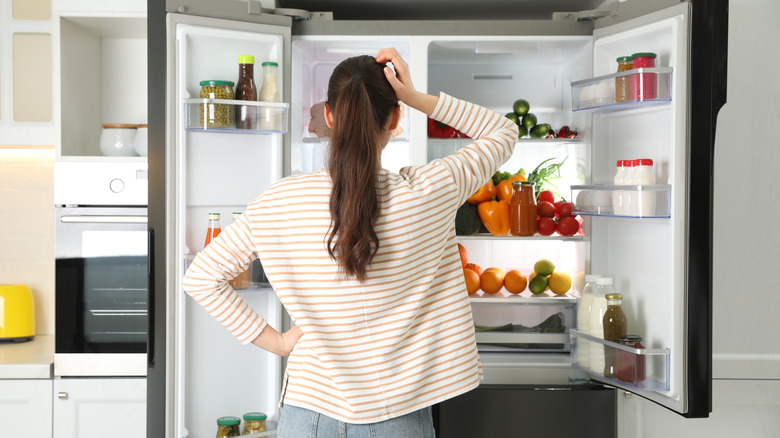What It Means When You Feel Hungry After Eating
Indulging in a delightful meal surrounded by friends or family can sometimes fill your heart with fond memories while filling your stomach — or so you think. After you leave the dinner table, you might feel hungry shortly afterward. This can be a little confusing, especially if you felt you ate plenty during your last meal.
Your post-meal hunger can be caused by a variety of reasons. Eating too quickly or eating while scrolling through your phone can make it feel like you ate enough, only to wind up hungry later, according to Healthline. If you exercise a lot, your metabolism might require you to eat more food and more often. The hormones that signal you're full could become out of whack if you're not getting enough sleep, leading you to feel hungry when you've had enough food. Having high blood sugar or insulin resistance might also signal your hunger pangs after eating. Two big reasons why you might feel hungry after meals are because the food itself isn't filling or you're developing leptin resistance.
What you eat could make you feel hungry later
Even if you start your day with breakfast, you could feel hungry on your way to work if you eat foods that pass too quickly through your digestive system, according to GoodRx. Many breakfast cereals and those tasty donuts lack the protein and fiber to keep you full. Additionally, these foods can also spike your blood sugar, leading you to reach for more food shortly after it plunges. Healthline suggests adding more protein to each meal to help keep you full. Protein is more efficient in stimulating fullness hormones such as glucagon-like peptide-1 (GLP-1). Adding fiber to your meals also stimulates GLP-1 and takes longer to digest than simple carbohydrates.
If you notice that you feel hungry after a meal, take a look at how much you're eating. Brave Space Nutrition says if you eat high-volume foods like popcorn, you could feel full but not have enough calories to sustain your energy levels. Using a calorie or food tracker can help you ensure you've eaten enough at each meal.
Your body may be secreting too much leptin
When you've had enough food, your fat cells secrete leptin to tell your brain that you've had enough food, according to University Health News. However, too much leptin can be a bad thing — when you have too much leptin circulating in your system, your cells can shut down the leptin receptors. This is called leptin resistance, and when you have this condition, your brain doesn't get the message that you've had enough food. This can make you reach for more food after you've eaten. To make matters worse, leptin also promotes fat storage.
High triglycerides in your system also interfere with leptin's ability to signal that you're full. It's best to avoid sweets, bread, rice, and pasta, as these foods can raise your triglyceride levels. Eating healthy fats, such as olive oil, avocado, and salmon, can improve the leptin signal. Exercise — particularly strength training and interval training — can also reduce leptin resistance (via University Health News).



